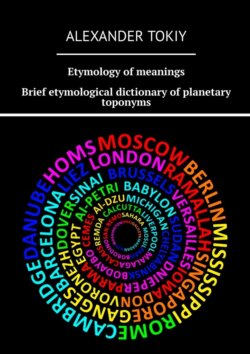Читать книгу Etymology of meanings. Brief etymological dictionary of planetary toponyms. At the origins of civilization - Alexander Tokiy - Страница 5
The soft sound “l’” or where does a hobby start?
ОглавлениеOnce in 1971, I returned from the army and got a job at Chelyabinsk television. I met a TV journalist, Samuel Gershuni. We went to the city of Zlatoust to shoot a video about the local watch factory. We lived in a hotel and spent long evenings talking about various topics. Samuel Matveyevich was a sociable man who liked to talk about his front life.
But one day we talked about his jewishness, biblical stories, and the languages which the ancient Jews spoken. It was the moment then I heard his explanation of the soft sound “el’”. We talked about the meaning of the word “Israel”, and Samuel Matveyevich explained that the soft sound “el’” means “God”, and the words “Israel’”, “Samuel’”, “Ariel’” are the names of various jewish tribes. For example, Israel is the God of the “Izra” tribe, and Michael is the God of the “Micah” tribe. Next we found words from other languages: for example, El’ Greco, El`brus, Hel`ius, Ol`ympus. My relatives – first of all my father and cousins – were Crimean Greeks and always emphasized that they were El`liny (Hellenes) And this name also begins with “el’”.
We had neither dictionaries at hand, nor the Internet to look at. So we didn’t get far that night, but the desire to find out what the Hellenes and Israel had in common came just then. I promised Samuel Matveevich that I would go to the library when I returned to Chelyabinsk. He smiled slyly and said that the answer should be found in the ancient jewish books, and in the Soviet Union they will not be found. However, I went to our public library and read all weekend. Thus, my fascination with etymology began.
The first discovery of the secret of the sound “el’” I made accidentally. Once I saw a little girl who was eating a chocolate bar. The chocolate was melting in her mouth, dripping on her bib, and she was laughing, trying to say something, and I distinctly heard that soft sound “el’”. I tried to collect my own saliva, but I couldn’t make the “el’” sound. Then I realized that it is not important the amount of saliva for this sound, but its release is. I filled my mouth with chocolate and waited for my mouth to drool, but it didn’t work either. Then the next day I ate nothing, drank only water, and, being hungry, put the chocolate back in my mouth. And the sound “el’ " took place!
This small discovery led me to believe that the first sounds that a person began to utter were related to his physiology. The state of pleasure, in which saliva is released and the sound “el’” appears, is remembered, fixed in memory or at the genetic level, and in the future, people transmitted the pleasure of life with this sound. Soft sound “el’” is a natural sound that was formed involuntarily, without meaning, expressing pleasant moments of eating.
So it was remembered once and the soft sound “el’” became “stronger, “matured” in languages and sounded like our usual “l”, although the meaning of pleasure, enjoyment remained for it. On its prehistoric “base” appeared a huge number of words, the meaning of which can somehow be reduced to the “common denominator”– joy, pleasure, delight, euphoria. What words could form this sound, this protoroot? Probably, the word “lubov” (love) comes to mind immediately— and quite justifiably! Laska (caress), ulybka (smile), lest’ (flattery), l`zya (permission), legko (easy), lizat’ (to lick), l`nut’ (to cling)—all go back to pleasure and delight. Including when the image of the highest bliss discloses a person. Hence the concept of divinity in different languages: this is Helios, and the Bible, and Israel, and Arabic word Allah, where the sound “l’” has not lost its softness.
It became clear to me that the soft sound “el’” is an involuntary sound, which was born in the depths of human feelings. And the usual “l” is the sound is already meaningful, introduced into the ancient communication system. This meaningful sound formed the protoroot, which combined with other sounds to create words. Knowing the semantic source, it is easy to understand how later meanings appeared.
The soft sound of “l’”, of course, was not the only one that participated in the multi-faceted “meaning-making”. But after that, it was easier for me to understand how other meaningful sounds developed.
